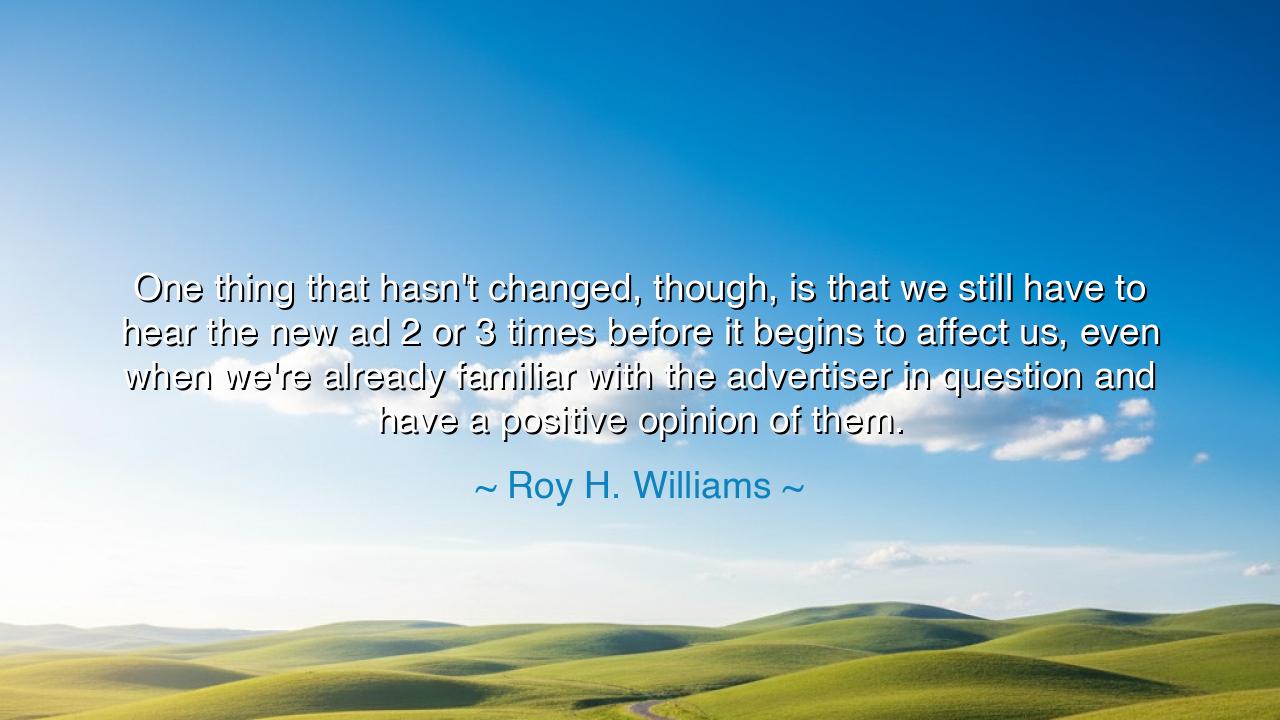
One thing that hasn't changed, though, is that we still have to
One thing that hasn't changed, though, is that we still have to hear the new ad 2 or 3 times before it begins to affect us, even when we're already familiar with the advertiser in question and have a positive opinion of them.






The words of Roy H. Williams — “One thing that hasn’t changed, though, is that we still have to hear the new ad 2 or 3 times before it begins to affect us, even when we’re already familiar with the advertiser in question and have a positive opinion of them.” — speak not only of commerce, but of the hidden laws of the human spirit. They remind us that repetition is the mother of persuasion, that truth or message must knock more than once upon the doors of the mind before the heart allows it to enter.
The ancients knew this well. The great orators — Demosthenes in Athens, Cicero in Rome — did not trust a single utterance to sway the multitude. They struck the same chord again and again, until it resonated within the souls of their listeners. Just as the farmer waters his field not once but many times before the seed breaks forth, so too must words be spoken often before they bear fruit in men’s thoughts. Williams’ reflection upon the ad is but a modern echo of this timeless law.
Even when we already hold a positive opinion of the messenger, the mind resists change until the message itself has proven its weight. This is why laws are debated, scriptures are recited, and songs of heroes are sung in chorus: so that the truth may be inscribed upon memory by the hammer of repetition. To hear once may stir curiosity; to hear twice may awaken thought; to hear thrice engraves the lesson upon the heart.
Consider the tale of Homer’s epics, recited across generations not from parchment but from memory. The poets repeated line after line, verse after verse, until the story became eternal, woven into the very fabric of the people. What might have been forgotten with a single telling became immortal through repetition. In the same way, an advertiser, a teacher, or a prophet must speak again and again if they wish their message to endure.
Let the generations remember: repetition is not weakness, but strength. A single blow may dent the stone, but many blows carve it into form. If you would shape the minds of men — whether through poetry, law, or the simple message of an ad — do not despair that you must speak more than once. For truth is not always embraced at first hearing; it must be courted patiently until it becomes part of the soul. Thus Williams’ words remind us that in persistence lies persuasion, and in repetition, victory.






WAWan an
Roy H. Williams’ insight about needing multiple exposures to an ad before it truly impacts us points to how advertising works on our subconscious. Does this reflect how we process information in a world overloaded with media? How does this constant repetition of messages influence consumer behavior over the long term? Are advertisers aware of this effect, and do they use it to their advantage in ways that could shape our purchasing decisions more effectively?
SAsks acv
It’s fascinating how Williams acknowledges the delayed impact of advertising, even when we like the brand. This suggests that our relationship with ads and products is more complex than just initial impressions. How much does familiarity with a brand influence our response to new ads? And if we need to hear an ad several times to be moved, does this imply that the real challenge for advertisers is not just attracting attention, but building lasting impressions over time?
VPNguyen Van Phong
Williams’ statement raises an important question about consumer behavior and how advertising works. If it takes two or three exposures for an ad to impact us, does this mean that brands need to be more creative in how they deliver their messages to make those first impressions count? How much do we really remember or care about an ad the first time we hear it, and what drives our decision to engage with it after repeated exposure?
VLLe Vy Loi
This quote by Roy H. Williams sheds light on the power of repetition in advertising, and how our minds need several exposures before we’re moved by a message, even if we already trust the brand. What does this say about the effectiveness of modern advertising techniques? Are we too desensitized by the sheer volume of ads we encounter daily? And what happens when we are finally swayed by the ad after multiple exposures—does it create a sense of urgency or mere familiarity?
TThao
Williams’ point about ads needing to be heard multiple times to be effective speaks to how ingrained advertising has become in our daily lives. Do we really need this kind of repetition to remember or respond to a brand, or is it a strategy to counteract our increasingly short attention spans? How does this constant exposure to ads affect our ability to make genuine, thoughtful decisions about the products we buy?